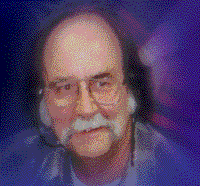

Can you prove him wrong? Here's a challenge you've probably heard often enough: someone poses a theory and asks you to disprove it! (Presumably, if you fail to come up with a disproof in about thirty seconds, the theory stands!) Note, however, that there's a bit of ambiguity here! A theory may fail to be disproven for several different reasons. It may be un-falsifiable since no test can be created which would disprove it, regardless of the result. If you have read this far, you will realize that this makes for a worthless theory! (There are still lots of people who like this kind of theory the best!)
On the other hand, the theory may be testable, but as yet untested. In this case, why argue? Do the test (if possible)!
The challenge to disprove something is often is a bit unfair, and the author should be chastised for throwing it in so glibly. Nonetheless, in this case you might try to think about what sort of experiment could be performed to challenge Frank's Theory, even if you might not have the time or equipment to perform it.
Note also: A dis-proven theory is better than an un-dis-provable one! The former does tell us something about the universe!
Elegance and Simplicity.
Scientists prefer theories that are simple. This was first clearly
stated by William of Ockham (1285 - 1347), who was more
of a theologian than a scientist. He said "What can be done
with fewer assumptions is done in vain with more" and "Plurality
should not be assumed without necessity". This is known as
Ockham's razor. If you have a theory and there are parts of the
theory that are not needed to explain the facts, then they are
not needed in the theory.
Simpler theories are usually easier to test than complex ones
and can be rejected more quickly if they are wrong. Some would
argue that simpler theories turn out to be correct more often
than complex ones. Others argue that nature has an aesthetic quality,
and that elegance and simplicity are part of that aesthetic.
Whether you buy that or not, it's still true that it's easier
to deal with simplicity than complexity, so as a practical matter,
go for the simple theory first.
William of Ockham, by the way, was excommunicated by the Pope
during his lifetime, but re-instated many centuries afterwards.
He was an anti-Platonist, and also believed that church property
should be taxed by the state.
Freud, Sigmund. A
General Introduction to Psychoanalysis (Boni & Liveright,
1924) is a good read for those interested in his theories.
Here you will learn that shoes, slipper and snails (?!) represent
female sex organs, and all manner of other wonderous nonsense.
I am suggesting that one read Freud, not because he had great
insights into Gelatinous Thought, but because his works are composed
of this substance. He is a good bad example.
Freud is important in the history of science for an odd reason.
For many years, scientists did science without much analysis of
how they did what they did. They did science intuitively, and
when they tried to describe how they did it, they usually got
it wrong! The one thing they didn't study scientifically was themselves!
Moreover, they tended to ignore those philosophers who studied
epistemology, the theory of knowledge. They had the same regard
for them that film directors do for critics. If you know so much
about how to do something, don't talk about it, do it!
However, Freud inspired several philosophers and scientists to
think deeply about what science was. Freud looked to a lot of
people like science, while others felt it was rubbish. Those who
rejected it were hard pressed to find an experimental dis-confirmation
of the theory. Unfortunately, if you reject something by instinct,
you're bound to seem snobbish or prejudiced.
Thus a more accurate analysis of what constitutes a meaningful
theory was required, and scientists have become more tolerant
of epistemologists ever since. Many even cross the line, and make
useful reflections on the philosophy of science themselves.
For a first-hand account of these issues, see Karl Popper,
Conjectures and Refutations: The Growth of Scientific Knowledge
(Harper & Row, 1968).
Education and Politics. In the opinion of this film-maker, the lack of critical, skeptical thinking is the biggest failing of the educational system of this country and others. Worse, the ommission is intentional! After all, would the Powers-That-Be remain in power if kids turned into really smart adults?
Jell-o. Those interested in delving into this subject should read Sigmund Freud. Not that he has anything interesting to offer on the subject. He's just a good bad example.
Meaning. Most people would feel that they have an easy time distinguishing a meaningful statement from a meaningless one. However, it's sometimes trickier than it seems. Have you ever listened to a political speech or sermon and come away with a somewhat empty feeling? There's an art to stringing together nouns and verbs in a way that create the illusion of meaning! One of my favourite gems of vapidity comes from former President Eisenhower of the U.S.A. : "Things are more the way they are now than they have ever been before!" Right on!
Scientists are picky, and they insist on a fairly strict definition of meaning! A meaningful theory is one that leads to testable predictions! The best theories make risky predictions; ones that you wouldn't expect by chance alone.
Some people believe that a theory that predicts a broad range of possibilites is a powerful theory, since so many things can be explained by such a theory. However, such is theory is actually less powerful than one that eliminates possibilities, by predicting which possibility will actually occur.
For example, the other day I saw a psychologist on television describing the symptoms of depression: you either slept too much or too little, or ate too much or too little, et cetera... The interviewer seemed a bit non-plussed; I suspect that he felt he was being described by the psychologist. The trouble is, unless you're one of the rare people who eat, sleep, drink, and do everything in exactly the right amount, you'll fit the definition regardless of whether you're depressed or cheerful! As a testable, and therefore meaningful theory of depression it's right up there with the political theories of Ike Eisenhower! How depressing!
Poetic Interpretation of Frank's Sun-Theory. Another way of looking at Frank's assertion (That the Sun is a Giant Carrot) is that it is not meant to be taken literally. A poetic human might state that "The Sun is Life, Life is the Sun..." Literally it is nonsense, but it does convey a meaning of another sort. Religions often devolve in this direction; statements taken literally in one era are regarded as metaphorical in a later age. Metaphorization is the Life-Support of a Moribund Philosophy.
The Rest of the humans in the film all act like the little girl, and need not be considered indiviually. They are happy to found a major cult based on Frank's parlour-trick. They will buy lottery tickets, consume placebos, send money to Evangelists, consult psychics, and have strong brand preferences. They are the salt of the earth.
Scientific Car Repair. I find that in the world of low-level practical scientific thinking, there is a great tendency to go for Theory #7, particularly among garage mechanics. When my car won't go, why not change all the parts that might be at fault? Afterwards, the car works! Theory confirmed!
Scientific Testing. A good theory has something to test, and is, in that sense, risky. A good test is an attempt to disprove the theory; it's not a friendly act.
I once saw a magazine article which described how psychiatrists were given drawings by Adolph Hitler and asked to analyse them; the psychiatrists happily went along with the task. A drawing of a hand, for example, was described as "clearly a hand grasping for power" and so on. No doubt a lot of folks were impressed by the power of psychiatry. Of course, the psychiatrists had been told whose drawings they were. It would having been more impressive if they hadn't been told, and best of all would have been to mix together a bunch of Adolph Hitler and Mother Teresa drawings and then ask the psychiatrists to categorize them. If they managed to distinguish Mother Teresa's "caring, helping hand" from Adolph's "grasping" one, I'd be more impressed.
Sometimes you have the luxury of several competing theories. Sherlock Holmes once said "When you have eliminated all that is impossible, whatever remains, however improbable, must be the truth." Holmes was a fictional detective, rather than a real scientist, but it's a pretty good bon mot. Unfortunately it's not quite perfect. It assumes that you've thought of ALL the possible theories that could explain a phenomenon. If you test, and thereby eliminate, all but one theory, does that mean you don't need to test the last one? This would be foolhardy! We often find that NO current theory cuts the mustard, and we have to go back to the creative, theory-forming phase. Nontheless, Holmes does point out the importance of trying to dis-prove theories!
Testability, Falsifiability.
Most scientific theories are never considered proven. In fact,
they cannot be proven, since it is always possible that a future
experiment will someday de-throne any theory. A Scientific Theory
actually gains credibility through its resistance to dis-proof.
That is to say, many experimenters will try to find ways to demolish
a theory. If they fail repeatedly, despite sincere efforts, the
theory gains acceptance.
However, a scientific theory never becomes impregnable. Einsein's
Theory of Relativity is holding up well after 70 years, but it
still doesn't have the authority of a Papal Bull. After all Newton's
Theory of Gravity seemed solid for centuries. Eventually some
observations failed confirm Newton (notably the orbit of the planet
Mercury), and Newton bit the dust. (To be fair Newton's Theory
is still cosidered a helluva-good-approximation-in-most-circumstances...
but not ***The Truth***)
Theories, Other.
Animator Brian Ducherer looked at this list and noted that I
had forgotten the theory that "It's just a dream that the
radio isn't working." Presumably the dream theory is one
that leaps immediately to mind for some folks (like Brian) whenever
things go awry. It's a testable theory. Just jump off a high
building. If you wake up in bed, you were right. If you wake
in the afterlife (Heck, say), then your theory has been falsified.
I'd leave this theory for last, though.
Lately, proponents of lucid dreaming have been encouraging people
to take control of their dreams. Once you realize you're dreaming,
you can control what happens, they claim. So perhaps you could
use your power to fix the radio, although, if I found myself able
to make absolutely anything happen, radios would not figure highly
in my scheme!
Transfundibulum,
Radiophonic. This refers to the substrate of inter-plane
flux that permeates the oleaginosphere. It is often taken for
granted until those moments when it becomes "fnorked".
This can be caused by Jovian atmospheric disturbances coinciding
with Shrove Tuesday. The result: lost socks, flaccid body parts,
and mute radios. Those experiencing these problems may be consoled
by the fact that their favourite programs may still be received
psychically.
